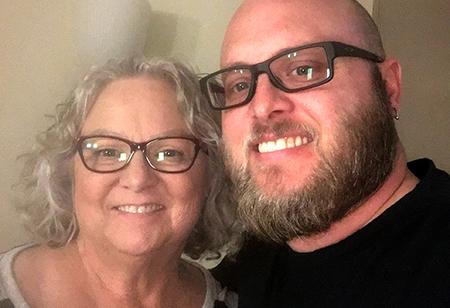Endometrial cancer strikes
Seven years later, Asta was diagnosed with cancer again, this time endometrial (the lining of the uterus). Her gynecologic oncologist suggested that she have genetic testing for Lynch syndrome. She tested positive, and all of her siblings tested positive, too.
A former executive at Arizona State University, Asta believes in higher education and "contributing to the betterment of the world." That's why she not only encouraged her own family members to be tested, but also anyone who knows or suspects that their family has a hereditary condition that affects the colon.
"I would say, if you think you have a hereditary inclination for something, don't be afraid of it," Asta said. "Knowledge is power. Take the necessary steps to get tested and treated."
Although she's not sure which side of her family carries the Lynch syndrome genes, Asta knows that the males in her family more often test positive for the condition. Her 40-year-old son, Jack, has Lynch syndrome, as well as Crohn's disease and ulcerative colitis, but her daughter does not have Lynch syndrome or other gastrointestinal conditions.
Today, Asta and her son are being treated by HonorHealth gastroenterologist Stuart Triester, MD. "Dr. Triester is very knowledgeable about Lynch syndrome. He understands it at a high level," she said.
"When patients are diagnosed with colon cancer at a young age, or with other cancers that may be associated with increased colon cancer risk, we perform genetic screening to identify inherited cancer risk syndromes," said Dr. Triester. "This helps shape the patient's management going forward. It also provides an opportunity to screen family members who might be at risk for the same syndrome and thereby prevent potentially devastating consequences of these disorders."
"If, over the years, you've been told that certain family members had colon cancer or polyps, it's important to get screened right away no matter how old you are," said Dr. Triester. "Colon cancer is one of the few cancers that is highly preventable. We can help you and your family members get the genetic testing and treatment you need right away."
Annual colonoscopy
Asta and her son get a colonoscopy every year. Every other year, at the same time as her colonoscopy, Asta gets an upper endoscopy, allowing her doctors to see all aspects of her upper gastrointestinal system, including her esophagus, stomach and duodenum.
Because of her personal cancer history, she also sees her oncologist every six months. "I get very good care," Asta said.
"Just because you have Lynch syndrome doesn't mean you'll get colon cancer; it just means that your propensity to get it is a little higher," she said. "In addition to the excellent care I receive, HonorHealth provides the proactive tools to help you and your family take necessary steps, including a letter that you can send to your family members to encourage them to get tested."
Her prognosis? "I think my prognosis is good. The chance that I might get colorectal cancer again may be higher, but I don't worry about it. I feel good, and I take care of myself."
A new retiree, she and her husband plan to start RV camping next month. They'll visit national and state parks throughout the U.S. "We wanted to retire while we are still young and robust."
Asta knows one thing for sure — Lynch syndrome won't slow her down.
